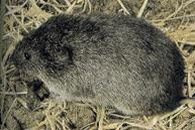ScienceNews quips: "There's news for women who want a man who bonds instead of a James Bond: Scientists have identified a common genetic variation that appears to weaken a man's ability to emotionally attach to one partner."

Found in the grasslands of North America, male prairie voles are known to form life-long monogamous pairings and raise their young. Scientists have long studied how prairie vole bonding has much to do with vasopressin activity in the brains of male voles.
Studies of male prairie voles have shown the same hormone - vasopressin - affects voles' abilities to remain monogamous. Vasopressin is released into the brain of mammals during sexual activity. The team found that men who carry one or two copies of the gene variant often behave differently in relationships than men who lack it.
The incidence of allele 334 [RS3 334] was statistically linked to how strong a bond a man felt he had with his partner. Men who had two copies of allele 334 [RS3 334] were also twice as likely to have had a marital or relational crisis in the past year than those who lacked the gene variant. There was also a correlation between the men's gene variant and what their respective partners thought about their relationship.
"Women married to men who carry one or two copies of allele 334 [RS3 334] were, on average, less satisfied with their relationship than women married to men who didn't carry this allele," said Walum in a press release.
Researchers examined the DNA of 552 sets of twins, all of whom were in a long-term heterosexual relationship - some were married and some were not - and had children. About 40 percent of the men have one or two copies of the allele. The participants were asked a series of questions about their relationship and their answers were then compared to their genetic make-up.
He further stressed that the effect of this genetic variation is relatively modest, and it cannot be used to predict with any real accuracy how someone will behave in a future relationship.
The findings are published in the Sept 2-5, 2008 issue of Proceedings of the National Academies of Science in a report titled "Genetic variation in the vasopressin receptor 1a gene (AVPR1A) associates with pair-bonding behavior in humans."
ScienceNews however also warns readers not to get ideas about a "DNA-fidelity test" as the study wasn't "designed to determine how much - or even whether - the gene in question is responsible for monogamy in humans." Researchers say they are hoping to gain more understanding about the gene which has been linked with autism - a condition characterised by problems with social interaction.
